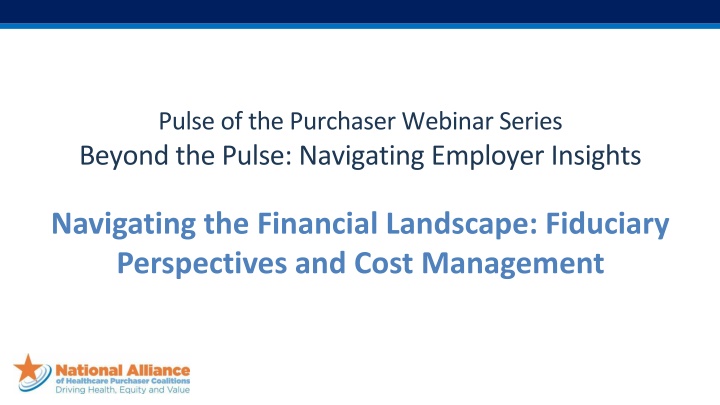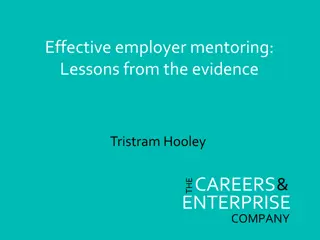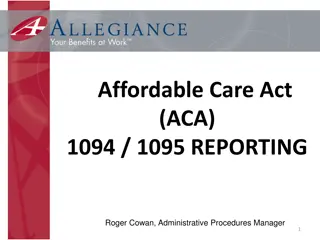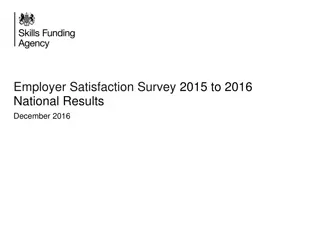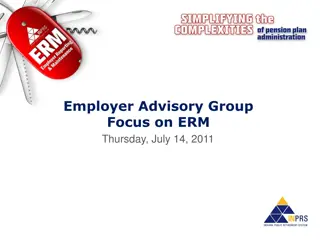Employer Perspectives on Fiduciary Challenges in Healthcare
Explore employer perspectives on fiduciary challenges in healthcare, including concerns about integrity and fees charged by hospitals, PBMs, TPAs, and consultants. Gain insights from a national survey on workforce, health strategies, and financial landscapes.
Download Presentation

Please find below an Image/Link to download the presentation.
The content on the website is provided AS IS for your information and personal use only. It may not be sold, licensed, or shared on other websites without obtaining consent from the author.If you encounter any issues during the download, it is possible that the publisher has removed the file from their server.
You are allowed to download the files provided on this website for personal or commercial use, subject to the condition that they are used lawfully. All files are the property of their respective owners.
The content on the website is provided AS IS for your information and personal use only. It may not be sold, licensed, or shared on other websites without obtaining consent from the author.
E N D
Presentation Transcript
Pulse of the Purchaser Webinar Series Beyond the Pulse: Navigating Employer Insights Navigating the Financial Landscape: Fiduciary Perspectives and Cost Management
Survey Summary Pulse of the Purchaser, a national survey of employers, was conducted November-December 2023 The survey gauged concerns and views of employers around the following: Workforce environment Health strategies (e.g., whole person health, equity, women s health, mental health, and obesity management) Fiduciary perspectives Hospital price strategies Pharmaceutical drug strategies High-cost claims strategies Potential health reforms The survey included 172 responses from private and public employers and purchasers across the country Wide range of sizes 26% <1,000 employees, 36% 1,000-4,999 employees, and 38% over 5,000 Representing numerous industries federal, state, or local government (18%), educational services (18%), manufacturing (14%), healthcare and social assistance (11%), retail/wholesale trade (8%), and finance and insurance (7%)
Employer/Purchaser Fiduciary Perspectives Most employers as fiduciaries are not confident in the integrity of services and fees charged under their plan Less than half of employers are confident in the practices and financials for hospitals, PBMs, TPAs, and even brokers and consultants Integrity and lack of conflicts in hospital billing practices 8% 23% 29% 40% Reasonability of hospital charges for the services provided 10% 18% 29% 42% Reasonability of PBM direct and indirect compensation for services provided Areas of highest concern include: 22% 30% 16% 32% Hospital charges for the services provided (71% concerned) Integrity and lack of conflicts in PBM administration 26% 24% 13% 38% Integrity and conflicts in hospital billing practices (69% concerned) Integrity and lack of conflicts in medical TPA administration 39% 29% 15% 16% Reasonability of medical TPA direct and indirect compensation for services provided 39% 32% 14% 15% Integrity and conflicts in PBM administration (51% concerned) Independence and lack of conflicts of my brokers and consultants 43% 37% 10% 11% PBM direct and indirect compensation (48% concerned) Reasonability of broker or consultant fees for the services provided 49% 34% 9% 7% Confident Somewhat Confident Somewhat Concerned Concerned
Employer/Purchaser Fiduciary Perspectives Most employers as fiduciaries are not confident in their intermediary s efforts to keep them in compliance Only a third of employers are confident in their TPA s compliance with the new mental health parity requirements Compliance of my plan administrators with mental health parity requirements as specified in new proposed regulations 33% 37% 17% 13% About 4 in 10 employers are confident that their intermediaries will help them meet transparency requirements related to: Support of my PBM to meet 6/1/2024 requirements for machine readable files of contract rates for pharmacy services 39% 35% 13% 13% Support of my TPA(s) to meet current requirements related to elimination of gag clauses 40% 33% 17% 9% Machine-readable files of all contracted rates for medical services Support of my TPA(s) to provide the Comparison Price Tool as required by 1/1/2024 Comparison Price Tool as required by 1/1/2024 40% 32% 11% 17% Support of my TPA(s) to meet current requirements for machine readable files of all contracted rates for medical services Elimination of gag clauses 43% 35% 14% 8% Machine readable files of contract rates for pharmacy services by 6/1/2024 Confident Somewhat Confident Somewhat Concerned Concerned I'm disappointed at these laws and the level of work and liability that is placed on employers. This has created a lot more work and to date, little value Survey respondent
Employer Perspectives on Hospital Pricing In light of hospital pricing practices, employers are getting increasingly selective in their benefits delivery strategies 9 out of 10 of plan sponsors believe hospital margins are unreasonable/indefensible Market consolidation has not improved costs and quality of services Market consolidation has improved cost and quality of services 52% 41% 8% Centers of excellence 41% 47% 12% Hospital pricing practices are both reasonable and defensible 44% 44% 12% Site of care strategies 32% 42% 26% Hospital prices are justified by uncompensated care and negative margins on public programs 40% 43% 13% Hospital margins are both reasonable and defensible Advanced primary care 21% 57% 21% 40% 50% 9% Hospitals generally operate efficiently 34% 48% 19% Direct contracting 20% 29% 51% High quality hospitals are more expensive than low quality hospitals 31% 40% 23% 6% Tiered networks 20% 56% 24% Hospitals are subject to market pressures similar to other sectors of the US economy 17% 15% 55% 13% Reference-based pricing 11% 47% 42% Strongly Disagree Disagree Agree Strongly Agree Hospital pricing is killing us Survey respondent Currently Doing Considering Next 1-3 Years Not Considering
Employer Perspectives on PBMs To what extent are you doing the following regarding your organization s pharmacy benefit management strategy: Employers are seeking to assert greater financial control of their PBM relationships Ownership of all data generated by the health plan 63% 30% 8% 4% 5% 7% 18% Confirmation that advisors do not receive any direct or indirect compensation from PBM or related third-party 28% 34% 57% 36% 8% Full and independent audit rights of PBM contract and rebate agreements 55% 36% 8% Comprehensive definition of the term 'rebate' to include other revenue streams (e.g., access fees, credits) 75% 32% 49% 18% 67% 61% Complete transparency regarding net/ingredient cost by drug 28% 59% 13% Full disclosure of all revenue streams with affiliated pharmacy-related entities Ensuring cost transparency and pass-through Ensuring value-based formulary and utilization management Managing member affordability 22% 63% 15% Currently Doing Considering Next 1-3 Years Not Considering Currently Doing Considering Next 1-3 Years Not Considering
Employer Perspectives on PBMs Employers are seeking to assert greater control of their formulary management Most employers already believe that their formulary: Promotes and includes biosimilars (69%) Removes low-value drugs (50%) Promotion and inclusion of biosimilars on formulary 69% 26% 6% Removal of low-value drugs 50% 31% 19% Key areas of focus being considered in the next 1-3 years are: Use of a value-based formulary versus a rebate-driven formulary (49%) Flexibility to customize formulary without financial penalties (43%) Flexibility to customize formulary without financial penalties 35% 43% 22% Use of a value-based formulary versus a rebate-driven formulary 31% 49% 20% Currently Doing Considering Next 1-3 Years Not Considering
Employer/Purchaser Perspectives on High-Cost Claims Glimpse into the future: The fastest-growing areas of health include promoting precision medicine, negotiating and auditing hospital prices, and confirming appropriate sites of care Current look into the environment: High-cost claims strategiesemployers are currently doing: 71% proactively managing complex cases Promoting precision medicine for cancer treatment 21% 50% 29% Negotiating and auditing hospital prices 18% 46% 37% Confirming appropriate site of care (e.g., centers of excellence, drug infusion centers) 43% 45% 12% 69% promoting early intervention Requesting audits of large claims 43% 45% 12% Confirming diagnosis with second opinions to reduce inappropriate care 33% 43% 25% Reducing risk of neonatal ICU claims (e.g., managed maternity, fertility benefits) 36% 41% 23% 62% reviewing pharmacy claims run through medical benefit Using captive reinsurance 11% 26% 63% Purchasing stop-loss coverage for high-cost claims 69% 10% 22% Currently Doing Considering Next 1-3 Years Not Considering
Pulse of the Purchaser Webinar Series Beyond the Pulse: Navigating Employer Insights Navigating the Financial Landscape: Fiduciary Perspectives and Cost Management Cora Opsahl, 32BJ Benefit Funds Moderator Darren Fogarty, Purchaser Business Group on Health Stephanie Koch, Hendry Marine Industries Karen van Caulil, Ph.D., Florida Alliance for Healthcare Value
